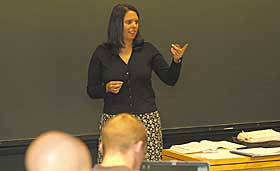|
This is an archived article.
For the latest news, go to the
Advance Homepage
For more archives, go to the Advance Archive/Search Page. | ||
|
Accounting Professor Emphasizes Several groups of students in Christine Earley's classroom want the Tyco case. Only one will get it. Another group wants HealthSouth, but it's already taken. These students in Earley's accounting class are choosing among 18 companies recently involved in financial reporting irregularities or fraud.
"The purpose of the project is to give students practice in researching cases, understanding the issues involved, and determining what role the auditors play and whether public perceptions are warranted," says Earley, an assistant professor of accounting. Another day, students in the course might be watching a video of the television news program "Nightline" covering details of the WorldCom scandal, or a "Frontline" segment on breakdowns in the system of corporate oversight in the 1990's. "With the crisis in confidence resulting from the Enron scandal and others, and the increase of regulatory scrutiny, it has become more critical than ever to address ethical issues in class," says Earley. "Students can learn from these mistakes." Earley was recently awarded the American Accounting Association Auditing Section's Innovation in Auditing and Assurance Education Award for the innovative coverage of professional ethics and ethical reasoning in her assurance services course (ACCT 243P). She has also received two awards from UConn: the 2003 University of Connecticut School of Business Innovation in Teaching Award, and the School of Business Undergraduate Teaching Award. The course, which covers the accounting profession and its rules and guidelines, is "the bridge between students' academic careers and their careers after college," Earley says. Most of the students, who are seniors, seek jobs in public accounting. "I believe it is important to teach professional ethics and promote ethical reasoning skills among accounting students," Earley says. "It's critical. Students can be taught to reason through ethical dilemmas and improve their cognitive moral reasoning skills." Earley earned a B.S. in accounting from UConn in 1990 and both an M.S. in cognitive psychology and a Ph.D. in business administration from the University of Pittsburgh. She was an auditor at KPMG for two years, and has taught at UConn since 1998. Earley's former students say the course prepared them well for their careers. Graduate student Kristen Lombardo says Earley "does a great job in helping her students understand the material at hand, as well as keeping it interesting. One of my favorite aspects of the class is how she brings into the classroom her own audit experiences, which really helps students better understand what life in the field will be like." Tim Bshara, an undergraduate, compared the course to the Defense Against the Dark Arts class in the Harry Potter novels. "The main purpose would not be to teach you how to get around the system or how to hex other people, but rather to defend yourself against such underhandedness," he said. Jen Boguslawski, another graduate student, says Earley's course was "one of my favorites in my undergraduate career. I feel that if faced with an ethical situation, I will know how to handle it, thanks to her class." Earley says students find it difficult to deal with ethical dilemmas - areas that are not black and white. "One goal of my course is to enable students to feel more comfortable dealing with gray areas, and have some practice reasoning through tough issues," she says. For example, "in public accounting there is often pressure to get a job done in a specific timeframe," she says. "Because people want to make themselves look good, they may underrepresent the time it took to complete a job. In class, we discuss why that's a problem and how it creates problems for setting budgets for the following year. "Also, it's easy to go along with the crowd or do what your manager tells you to do, because you don't want to lose your job," Earley says. "But I teach my students to look at the bigger picture. I want them to think about the impact the decisions they make will have on other people." When discussing cases, Earley provides little guidance as to the 'right' answer. "Students will tend to get involved in debates on the issue," she says, "and there are times when we leave the discussion unresolved. In these situations, students are evaluated on their ability to reason through the problems in a consistent and logical manner, and to evaluate how their actions would affect others." |

